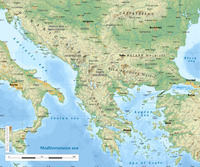- General Place
- Balkan Peninsula (english) | Βαλκανική χερσόνησος (greek) | Балкански полуостров (Bulgarian) | Peninsula Balcanică (rum) | Балкански Полуостров (Macedonian)
- English
- Peninsula
- Collection Balkan Athletics Championships
- Yugoslavia | Bulgaria
- Serbia | Turkey | Romania | Ελλάδα
-
- Q23522 ⟶ Q23522
-
- 252087561 ⟶ Click Here
-
-
The Balkans (/ˈbɔːlkənz/ BAWL-kənz), also known as the Balkan Peninsula, is a geographic area in southeastern Europe with various geographical and historical definitions.[1][2][3] The region takes its name from the Balkan Mountains that stretch throughout the whole of Bulgaria. The Balkan Peninsula is bordered by the Adriatic Sea in the northwest, the Ionian Sea in the southwest, the Aegean Sea in the south, the Turkish Straits in the east, and the Black Sea in the northeast. The northern border of the peninsula is variously defined.[4] The highest point of the Balkans is Mount Musala, 2,925 metres (9,596 ft), in the Rila mountain range, Bulgaria.
The concept of the Balkan Peninsula was created by the German geographer August Zeune in 1808,[5] who mistakenly considered the Balkan Mountains the dominant mountain system of Southeast Europe spanning from the Adriatic Sea to the Black Sea. The term Balkan Peninsula was a synonym for Rumelia in the 19th century, the European provinces of the Ottoman Empire. It had a geopolitical rather than a geographical definition, which was further promoted during the creation of the Kingdom of Yugoslavia in the early 20th century. The definition of the Balkan Peninsula's natural borders does not coincide with the technical definition of a peninsula; hence modern geographers reject the idea of a Balkan Peninsula, while historical scholars usually discuss the Balkans as a region. The term has acquired a stigmatized and pejorative meaning related to the process of Balkanization.[4][6] The alternative term used for the region is Southeast Europe.
⟶ wikipedia
-





